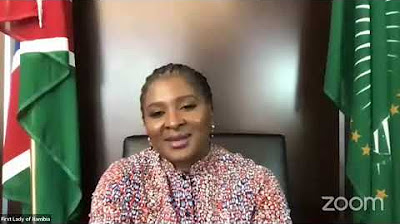Smriti Irani on Women Issues - Congress Must Watch before Commenting on Her !
Summary
TLDRThe speaker reflects on women's voices, leadership, and global conflict, emphasizing the need for women to be heard and empowered. She shares anecdotes about women's struggles, including a mother in India fighting for her daughter's survival, and highlights India's cultural values of unity and righteousness. The speech calls for global connections based on mutual respect and empowerment, particularly through women's education and leadership. Ultimately, it advocates for a world where both men and women have equal opportunities, driven by a collective commitment to humanity's well-being and peace.
Takeaways
- 💬 Women don't have a problem speaking out, they have a problem being heard.
- 🌍 The platform provided by the Art of Living offers women worldwide an opportunity to speak and be heard constructively.
- 📜 Historical and cultural references, like Lord Rama's decision in the Ramayana, emphasize India's value of the feminine virtue in nation-building.
- 🇮🇳 India champions the idea of 'Vasudev Kutumbakam'—the world as one family—promoting global unity and connection.
- 🎓 Investing in women's education and leadership reduces conflict and fosters stronger nations.
- 👩💼 Female leadership is distinct because it guides people toward where they ought to be, not just where they want to be.
- ⚖️ Legislation alone may not be enough to solve issues like women’s safety and gender-based violence; a change in societal attitudes is essential.
- 🧑🤝🧑 Women globally share common struggles and aspirations for dignity and equality, creating a cultural connection beyond politics and language.
- 💔 Gender-based issues like female infanticide and violence against women remain prevalent, deeply affecting society.
- ✨ True global connection and harmony will come from empowering women and ensuring equality, helping overcome both national and global conflicts.
Q & A
What platform is mentioned in the transcript as providing a space for women to speak and be heard?
-The Art of Living is mentioned as providing a harmonious platform for women from across the world to speak up and be constructively heard.
How does the speaker relate India’s culture to the empowerment of women and nation-building?
-The speaker highlights that India, as a culture, has infused feminine virtues into the pursuit of a strong nation. Through epics like the Ramayana and teachings of Lord Krishna in the Bhagavad Gita, India promotes the idea that a strong nation is built on righteousness and service to humanity.
What does the speaker suggest is a significant factor in reducing conflict on a global scale?
-The speaker suggests that empowering women and placing them in leadership roles is a significant factor in reducing conflict globally. Women leaders tend to focus on resolving issues related to poverty, illiteracy, and resource ownership.
What does the 1996 study mentioned in the transcript conclude about investing in women's higher education?
-The 1996 study, involving 72 countries, concluded that nations that had invested in women's higher education in 1975 saw a 68% decline in infant deaths by 1985. The same study found that increasing per capita income had no significant impact on reducing infant deaths.
What story does the speaker share to highlight the cultural challenges faced by women in India?
-The speaker shares a story about a woman from Punjab who was forced by her husband and brother to leave her third daughter to die in the cold. However, the daughter survived, and the mother decided to fight for her child's life, symbolizing the strength and resilience of women.
What does the speaker believe is necessary for true empowerment beyond legislation?
-The speaker believes that while legislation is important, it is not enough to truly empower women. Society must embrace change at a cultural level, and individuals must embody the change they wish to see, as advocated by Mahatma Gandhi.
How does the speaker define the difference between a leader and a female leader?
-The speaker defines a leader as someone who takes you where you want to be, but a female leader as someone who takes you where you ought to be.
What is the significance of the concept 'Vasudev Kooten' mentioned in the transcript?
-'Vasudev Kooten' is a Sanskrit phrase meaning 'the world is one family.' The speaker uses this concept to emphasize India's philosophy of global unity and serving not just national interests but the welfare of humanity as a whole.
What emotional challenges does the speaker express about raising women's issues in the Indian Parliament?
-The speaker expresses deep emotional pain when raising issues like rape and female infanticide in Parliament. She is heartbroken by the fact that over 1 crore (10 million) girls die in India every year due to sex-selective abortions, and these issues are often ignored because children are not seen as vote banks.
What is the main message the speaker hopes to convey regarding global leadership and conflict resolution?
-The speaker hopes to convey that true global leadership and conflict resolution come from empowering women and fostering connections that go beyond political or national interests. By treating everyone as equals and focusing on the welfare of humanity, the world can overcome conflicts and work towards shared goals.
Outlines

このセクションは有料ユーザー限定です。 アクセスするには、アップグレードをお願いします。
今すぐアップグレードMindmap

このセクションは有料ユーザー限定です。 アクセスするには、アップグレードをお願いします。
今すぐアップグレードKeywords

このセクションは有料ユーザー限定です。 アクセスするには、アップグレードをお願いします。
今すぐアップグレードHighlights

このセクションは有料ユーザー限定です。 アクセスするには、アップグレードをお願いします。
今すぐアップグレードTranscripts

このセクションは有料ユーザー限定です。 アクセスするには、アップグレードをお願いします。
今すぐアップグレード関連動画をさらに表示

Celebrating the Women of Ansarada

Freedom to be the ABW - The Angry Black Woman | Lisa Fritsch | TEDxGreatHillsWomen

Chinese president Xi Jinping's address on gender equality

Namibia's First Lady Monica Geingos Strikes Chord With Youth and Power Talk

Women's Involvement In Politics | Muriel Collins | TEDxUniversityofMississippi

Miss Representation Trailer (2011 Sundance Film Festival Official Selection)
5.0 / 5 (0 votes)
